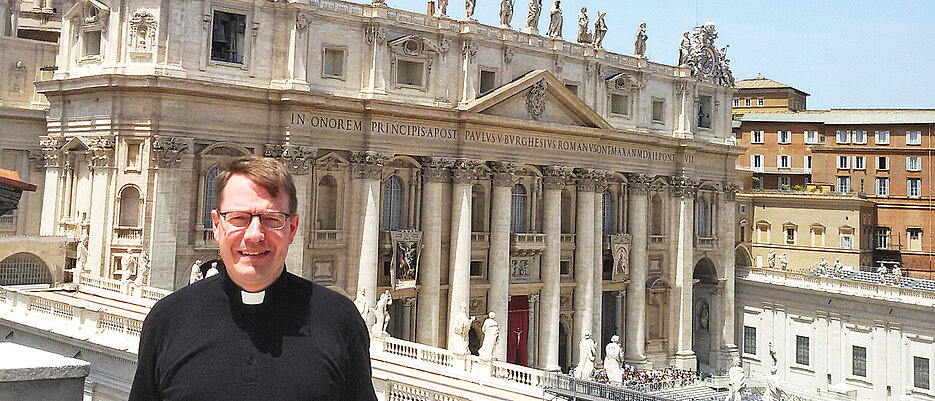From Würzburg into the world
07/31/2019He works in the Vatican and deals with severe violations of the church's moral doctrine among others. Nevertheless, Manfred Bauer considers his everyday work routine to be as ordinary as that of any other office job.

Which jobs do graduates from the University of Würzburg work in? To present different perspectives to students, Michaela Thiel, the director of the central alumni network, interviews selected alumni. This time, it's Manfred Bauer's turn. Bauer started studying for a law degree at the University of Würzburg in 1986. From 1997 to 2001, he studied Catholic theology, earning a PhD in both disciplines in 2002. Moreover, he studied canon law at the University of Munich. Since 2014, Bauer has been working in the disciplinary section of the Congregation for the Doctrine of the Faith (CDF) of the Catholic Church in Rome whose job it is "to promote and safeguard the doctrine on faith and morals in the whole Catholic world."
Dr Bauer, how did you end up working in the Vatican? In 2014, there was a vacancy for a German-speaking employee in the disciplinary section of the CDF. Due to my qualifications in law, theology and church law, I was chosen to fill the vacancy.
What does your typical day at work look like? My work routine is as unspectacular as that of any office job. It is probably not much different from what goes on at any other court, ministry or international organisation: Cases and issues from around the world are submitted for decision. Therefore, the staff members of the Congregation for the Doctrine of the Faith, and of the Curia in general, must represent the most important or rather the most common languages in the world. The everyday working language is Italian by the way.
What cases are you dealing with? The cases submitted to the CDF concern the so-called "reserved delicts" in particular, which means that the CDF has the exclusive competence based on the reservation. Such delicts include offences against the faith as well as more grave delicts in the celebration of the sacraments. But most offences of the past years clearly concern serious violations of the church morals and in particular the tragic abuse cases that need to be solved, and if necessary, punished during criminal proceedings through court or administrative channels on behalf of the CDF. Often this is still possible even after the statute of limitations has expired according to state law by the way. Based on the Church's criminal law, the statute of limitations for the sexual abuse against minors is 20 years following the 18th birthday of the victim. In individual cases, the CDF may also suspend a statute of limitations already in effect.
What's it like to live in the Vatican? I have always had a rather romantic notion of what this means. Life in the Vatican is not very romantic. Of course, it is nice to see the side façade and the dome of St. Peter's Basilica every time you look out of your flat's window. But living in the Vatican you don't just look out of the window the whole day. During everyday life, each member of the Curia has to do their job first and foremost.
Do you meet the pope from time to time? Over the past five years, I have talked to both Pope Francis and his predecessor, the retired Pope Benedict XVI, a few times. But these encounters were always rather short. It was more like doing small talk because the pope obviously discusses important topics with the heads of the dicasteries with whom the individual members of the Curia are in close contact.
What is Pope Francis's most distinctive feature in your opinion? I believe it is his great commitment to fighting poverty in the world and its manifold causes.
You were an officer of the deanery for ecumenism, interreligious dialogue and worldview in the deanery of Kitzingen. How do you see the general status quo of the interreligious dialogue worldwide today? The interreligious dialogue under Pope Francis has continued to gather momentum as already under his predecessors. We are looking to deepen interactions especially with representatives of Islam to contribute to a peaceful world. And, fortunately, also the relationship to Judaism in particular and to other Christian denominations can generally be considered positive and relaxed, aside from a few issues that is.
Thank you for the interview.
If you want to learn more about the alumni network of the University of Würzburg or to register, follow the link below.






